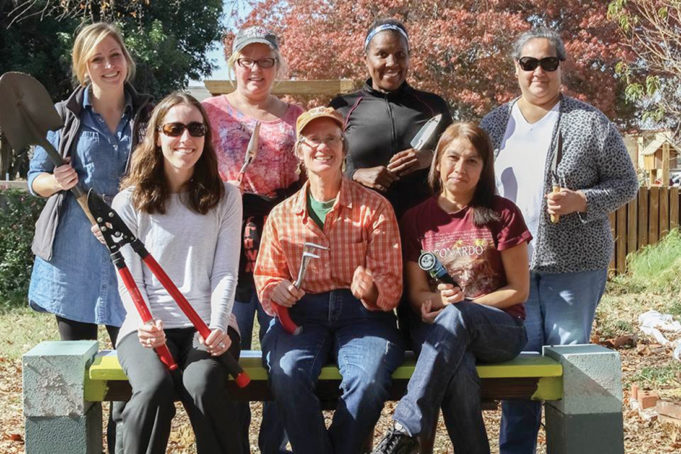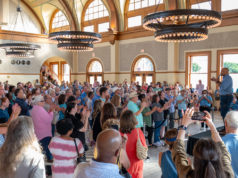Jesus took five barley loaves and two small fish offered by a boy and used them to perform a miracle, feeding a crowd of 5,000, with food left over. A similar miracle of sorts is happening in West Fort Worth, where a quarter acre of church-owned land is producing 2,500 pounds of fresh produce annually that helps feed growing numbers of homeless and families dealing with food insecurity in southwestern Tarrant County.
Since the first seeds of the partnership between Ridglea Christian Church and the Tarrant Area Food Bank were planted in 2014, hundreds of families served by the WestAid food pantry have developed healthier lifestyles, taking home more fresh food and not as much less-healthy canned and processed foods. Food bank staffers even use vegetables harvested from the Ridglea-based Learning Garden to provide free cooking classes in the food bank’s Kindred Spirits demonstration kitchen in the Dorothy and Norman M. Kronick building at 2525 Cullen St. Participants are schooled on several ways to prepare each vegetable.
Anita Foster, senior director of communications and marketing for the food bank, said that the Learning Garden’s impact on WestAid’s clients has been “amazing.”
The food bank industry as a whole, she said, “is really changing focus from being a place where people bring cans of donated food and bags of rice – not that there’s anything wrong with [those donations], by the way. In the beginning, that’s how we fed people. We didn’t have strong refrigeration systems or freezer systems. But the focus today has shifted to nutrition. The garden is providing healthy, nutritious food, and that is the core of the mission of what we do every day.”
Ridglea Christian Church, located on West Elizabeth Lane, has worked with WestAid for years and has long had a mission for meeting hunger needs. The church’s motto is “Sewing Seeds, Cultivating Community. Come Grow with Us!”
“We decided a long time ago that helping to feed people who were hungry was essential,” said Associate Minister Allison Lanza.
The Learning Garden came about after the church first started its Jubilee Garden, where church members and others in the community can rent plots for $30 per year. That garden began after Ridglea’s college ministry worked with some of the congregation’s older members to plant potatoes at the back of the church property. Money raised from plot rentals is used for compost and other garden-related needs. Some who rent plots are apartment dwellers. The Jubilee Garden includes plots where food is free for the taking.
“We started the Jubilee Garden with encouragement from some of our TCU students,” said church member Janet Lanza, Allison’s mom. It started, she said, with a few small plastic plots and led to the construction of 19 4-by-8-foot beds, with church volunteers filling them with “good soil.”
Janet said that at the time the Jubilee Garden was getting started, a church member commented that it would be a good way to bring in new members. But the pastor, Janet said, “wisely replied, ‘No, this will be another good way to take our church into the community.’ ”
After hearing that the food bank was looking for a partner for a community garden, church member Carolyn Sedinger took on the task of applying on the church’s behalf. The grant doesn’t involve money but rather a partnership. The food bank provides staff to lead volunteer days, and the church provides volunteers, land, water, and space inside the church. That space includes a room for gardening classes and a room for a seed library, where there are books on gardening and plastic tubs containing worms for composting.
“Even though I did write the grant, it was only a small part of what happened,” Sedinger said. “The grant started the ball rolling, and the garden today is so much more than what I ever thought could happen.”
The patch serves as a demonstration site where people interested in starting their own gardens can learn skills such creating raised beds or “living fences” using larger herbs and perennials for a soft border. Students at local schools also learn and perform volunteer tasks at the garden.
Food bank Nutrition Services Manager Micheline Hynes said the nonprofit received eight applications when it was seeking a location for a community garden on the West Side and conducted five interviews before choosing Ridglea. She said she “loved” the church right away “because the people were just right for partnering with us.”
Sarah Lewis, WestAid’s director of operations, said that food from the Learning Garden “changes the atmosphere in homes” because it’s “not another can of green beans.”
Lewis said they were surprised by “how many kids actually enjoyed” the vegetables, snacking on cherry tomatoes and snap peas while their parents go through the food pantry.
“They love them,” she said.
Those who qualify can “shop” in the food pantry once every three months and choose among canned goods, breads, frozen meats, granola bars, and, of course, fresh fruits and vegetables. All other months, they can pick up a “gap bag” containing such items as canned goods, rice, beans, pasta, and cereal. Families of five or more receive two “gap bags.”
Those who are homeless can receive three sack lunches per week. When available, Lewis said, fruit from the Learning Garden is put into a “goodie bin” on Fridays to help homeless clients make it through the weekend.
Lewis said that food pantry clients are now asking for the fresh produce hauled in from the Learning Garden.
“They’re realizing that the produce comes in on Tuesday afternoons,” so they come in on Wednesday mornings asking for it, she said.
Located at 7940 Camp Bowie West, WestAid is open from 9:30 a.m. to 2:30 p.m. Monday through Thursday, serving 50 clients per day, and from 9:30 a.m. until noon on Friday, when 25 clients are served, Lewis said. Vegetables grown in the Learning Garden include tomatoes, peppers, beans, peas, kale, lettuce, chard, eggplant, cucumbers, broccoli, cabbage, and more. Blackberries, strawberries, and figs are some of the fruits, and there are also herbs (basil, rosemary, cilantro, dill). Even flowers and pollinators are grown there.
Both the Learning Garden and the Jubilee Garden foster community engagement, Lanza said. Those who rent plots in the Jubilee Garden often show up at either 5 p.m. or 6 p.m. on Thursdays (depending on the time of year and what time the sun goes down) to enjoy tending their areas in the company of fellow gardeners.
Katherine Randall, a website specialist for the food bank and an apartment dweller, said she knew little about gardening but began growing tomatoes in a pot on the patio of her 7th Street apartment after she was given seedling tomato plants and training from the community garden team last April.
“It was really easy,” she said. “People are not only learning how to prepare amazing meals, but they’re also learning how to grow that produce themselves. I personally don’t have a lot of gardening experience, but I have learned so much from just talking to our community garden coordinators and being part of different events they have.”
Lewis said of the partnership between the food bank and Ridglea, “We love them, and we hope that they continue growing for many years to come. They’re a huge asset to the west side of Fort Worth.”












